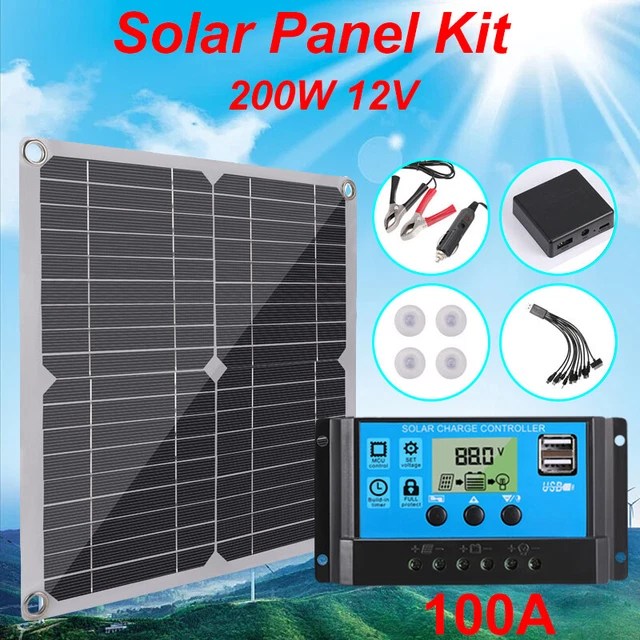Cutting the Cord: The Rise of Solar Boat Battery Charging
Imagine gliding silently across the water, the only sound the gentle lapping of waves against your hull. No rumbling engine, no fumes, just the pure serenity of nature. This dream is becoming a reality for more and more boaters, thanks to the increasing accessibility and efficiency of solar boat battery chargers. These devices, harnessing the power of the sun, offer a clean, quiet, and cost-effective way to keep your boat's batteries topped off, whether you're anchored in a secluded cove or cruising the open ocean.
The days of relying solely on noisy, polluting generators or shore power are fading. A solar charging system for your boat can provide a reliable source of energy for everything from running navigation lights and bilge pumps to powering small appliances and even charging your devices. This shift towards renewable energy on the water isn't just a trend; it's a reflection of a growing awareness of our environmental impact and a desire for a more sustainable boating experience. But how exactly do these systems work, and what are the key considerations for boat owners looking to make the switch?
Solar boat battery chargers, also known as solar panels for boats or marine solar panels, function much like their land-based counterparts. They capture sunlight through photovoltaic cells and convert it into direct current (DC) electricity. This DC electricity is then passed through a charge controller, which regulates the flow of energy to your boat's batteries, preventing overcharging and damage. The charge controller also optimizes the charging process, ensuring maximum efficiency from the solar panels.
The history of solar powered solutions for boats is intertwined with the development of photovoltaic technology itself. Early iterations were expensive and inefficient, limiting their widespread adoption. However, advancements in solar cell technology have led to significant improvements in both cost and performance. Today's marine solar panels are more durable, compact, and efficient than ever before, making them a viable option for a wide range of boat types and sizes.
The importance of solar boat battery charging extends beyond mere convenience. It represents a significant step towards eco-conscious boating. By reducing reliance on fossil fuels, solar charging minimizes greenhouse gas emissions and helps protect the delicate marine ecosystems we enjoy. Additionally, the silent operation of solar panels eliminates noise pollution, contributing to a more tranquil and immersive experience on the water. This shift towards sustainable energy is also driven by the increasing cost of fuel and the desire for energy independence, allowing boaters to explore further afield without worrying about finding a fuel source or electrical hookup.
One major benefit is cost savings. Once installed, a solar boat battery charger provides free electricity, reducing or eliminating fuel costs for battery charging. Another key advantage is environmental friendliness. By harnessing renewable solar energy, you minimize your carbon footprint and contribute to a cleaner marine environment. Lastly, solar chargers offer increased independence. You're no longer tied to marinas or shore power for battery charging, allowing for greater freedom to explore remote anchorages and waterways.
Advantages and Disadvantages of Solar Boat Battery Chargers
| Advantages | Disadvantages |
|---|---|
| Environmentally friendly | Dependent on weather conditions |
| Cost-effective in the long run | Initial investment can be high |
| Quiet operation | Requires space for panel installation |
Best Practices for Implementing a Solar Boat Battery Charging System:
1. Correctly size your system based on your energy needs.
2. Choose high-quality marine-grade solar panels and charge controllers.
3. Mount the panels securely and in a location with maximum sun exposure.
4. Regularly clean the panels to maintain optimal performance.
5. Inspect the system periodically for any signs of wear or damage.
Frequently Asked Questions:
1. How much do solar panels for boats cost? The cost varies depending on the size and type of system.
2. Can solar panels power my entire boat? It depends on the size of your boat and your energy consumption.
3. How long do solar panels last? High-quality marine solar panels can last for many years.
4. Do I need a charge controller? Yes, a charge controller is essential to protect your batteries.
5. Can I install solar panels myself? It is possible, but professional installation is recommended.
6. What type of maintenance do solar panels require? Regular cleaning is the primary maintenance task.
7. How do I choose the right solar charger for my boat? Consider your energy needs and the available space for panel installation.
8. Can solar panels be used in cloudy weather? They can still generate some power, but output will be reduced.
Tips and Tricks:
Maximize sun exposure by adjusting panel angle throughout the day. Keep panels clean for optimal performance. Consider portable solar panels for added flexibility.
In conclusion, embracing solar boat battery charging is more than just a technological upgrade; it's a commitment to a more sustainable and enjoyable boating experience. The benefits, from fuel savings and environmental responsibility to enhanced independence and quiet operation, are undeniable. While there are upfront costs and installation considerations, the long-term advantages of harnessing the sun's energy far outweigh any initial investment. By understanding the principles of solar charging, choosing the right system for your needs, and adhering to best practices, you can unlock the true potential of solar power on the water, ensuring your boating adventures are powered by clean, renewable energy for years to come. As technology continues to advance and costs continue to decline, the future of boating is undoubtedly solar. Take the plunge today and join the growing community of boaters who are harnessing the power of the sun to explore the world's waterways in a more responsible and sustainable way. It's time to cut the cord and embrace the freedom and tranquility of solar-powered boating.
Understanding the nassau county jail system
Craving steak dive into the longhorn steakhouse sanford menu
Sherwin williams vs behr color match the ultimate guide













